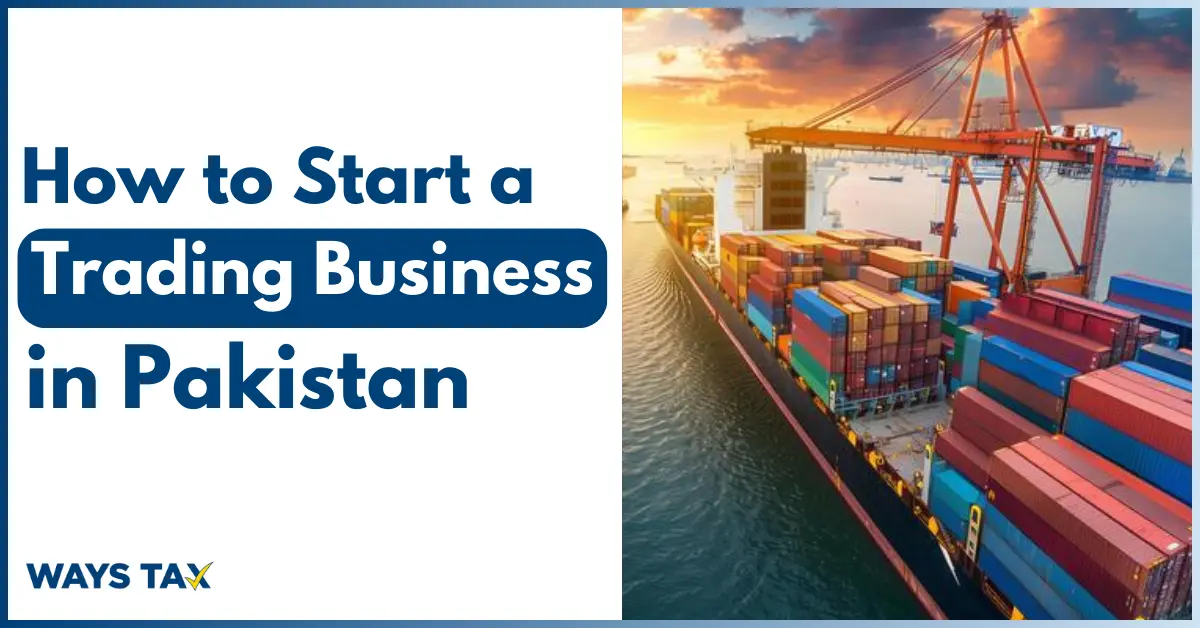How to Start a Trading Business in Pakistan: A Complete Guide by Ways Tax
Starting a trading business in Pakistan isn’t just an opportunity—it’s a step into a world of possibilities. Pakistan’s economy is bustling with activity, supported by its strategic location, vibrant consumer market, and growing international trade ties.
Did you know that exports of goods and services account for 10.47% of Pakistan’s GDP, while imports make up a significant 21.85%? These figures, shared by WITS World Bank, highlight the country’s dynamic role in global trade.
Whether you’re a budding entrepreneur eyeing local markets or an ambitious trader planning international ventures, Pakistan offers a fertile ground to grow your business.
In this guide, we’ll break down everything you need to know about How to start a trading Business in pakistan—from niche to registering your trading business with Ways Tax—so you can confidently embark on your trading journey.
Register Your Trading Business Hassle-Free
We handle the paperwork so you can focus on trading and growth.

Step-by-Step Guide on How to Start a Trading Business in Pakistan
Below are the essential steps you need to follow to successfully start and grow your import-export-trading business in Pakistan.
Step 1: Conduct Market Research
Examine the domestic and the international environment. So, go to Statista, Trade Map, or governmental trade reports, to obtain some data regarding the specified niche or market.
Step 2: Choose Your Trading Niche
Picking your niche is crucial in determining the kind of products to be imported or exported into the market.
You should begin the process by identifying; products that are in high demand locally and internationally.
For example, relations to factors such as profit margins, legalities, and suppliers.
Step 3: Create a Business Plan
A business plan essentially provides you with a comprehensive guideline on the operation of the business.
It assists in putting a certain goal into a plan so that it may be realized fully.
Key Elements of a Business Plan

Step 4: Get funding for your business
Starting an import-export business requires a solid financial foundation to cover initial costs like buying products, shipping, marketing, and handling unexpected expenses.
You can use personal savings, ask family for help, take a loan from a bank, or pitch your business idea to investors.
If you are importing goods, some suppliers may agree to send products and allow you to pay later.
Step 5: Choose a Legal Business type in Pakistan
When starting a business in Pakistan, selecting the right structure is key. Here are your options:
- Sole Proprietorship: Owned by one person. Simple setup, but the owner is personally responsible for all debts.
- Partnership firm: Two or more people share ownership, profits, and responsibilities.
- Limited Liability Company (LLC): Protects owners’ personal assets and is ideal for medium to large businesses.
- Single Member Company (SMC): Like an LLC but owned by one person, offering limited liability.
- Public Limited Company: Can sell shares to the public, suitable for large-scale businesses.
- Cooperative Society: A group of individuals united for shared economic or social goals, with equal voting rights.
Choose what fits your needs, then secure your business name and domain to get started.
Step 6: Reserve a company name
To register a company in Pakistan, the first step is to reserve a company name with the Securities and Exchange Commission of Pakistan (SECP). The SECP oversees company registrations, ensuring legal compliance and protecting investors.
To reserve your company name, visit the SECP’s e-Services portal and submit three name options in order of preference. The SECP will check if the names are available and follow their rules. Your name should not be the same as an existing one or be offensive.
Reserving your company name is the first step to legally setting up your business in Pakistan. Make sure the name follows SECP guidelines to avoid delays in the registration process.
Step 7: Register Your Business

Business registration in Pakistan is necessary as it provides your trading business with legal personality and authority to conduct business legally.
Simplify Your Trading Journey with WaysTax
From business registration to customs assistance, we’ve got you covered.

Step 8: Open a Business Bank Account
To manage your company’s finances, you must have a business bank account. Here’s what you need to do:
Required Documents:
Choosing the Right Bank:
Step 9: Set Up Accounting and Bookkeeping
Keeping accurate financial records is very important for your business. It helps you track how your business is doing, prepare for audits, and pay your taxes correctly.
Accounting Tools:
Benefits:
Step 10: Hire Employees and Understand Labour Laws
Hiring the right employees and following labor laws is key to growing your business and staying legal.
Hiring Employees:
Labour Laws in Pakistan:
Compliance with Labour Laws:
Step 11: Obtain Licenses and Permits

Some products bear certain special and specific business licenses in Pakistan or permits depending on the regulations expected to be fulfilled.
Details About Business Permits
| License/Permit | Description | Fee | Processing Time |
| General Business License | Required for all businesses. Apply to the local municipal authority. | PKR 10,000 | 2 weeks |
| Trade License | Needed for businesses involved in trading activities. Apply to the trade authority. | PKR 15,000 | 3 weeks |
| Health and Safety Permit | Required for food and beverage businesses to ensure health and safety standards. | PKR 8,000 | 1 month |
| Environmental Permit | For industries affecting the environment. Obtain from the Environmental Protection Agency. | PKR 20,000 | 2 months |
| Fire Safety Certificate | Issued by the fire department to ensure fire safety measures are in place. | PKR 5,000 | 1 month |
Let Us Do the Licensing & Permit Part for You!
From licensing to tax filing, we make your trading business setup stress-free.

Step 12: Build Relationships with Suppliers and Distributors
Strong relationships with suppliers and distributors are essential for smooth operations.
Step 13: Understand Taxation and Compliance
Taxation and compliance are critical to keeping your business in good standing with authorities.
Step 14: Develop a Marketing and Sales Strategy
Marketing and sales strategy enables you to access the target market and create popularity for your brand.
Step 15: Start Small and Scale Gradually
Begin with smaller orders and scale your operations as you become more comfortable with the market.
What Is a Trading Business?
A trading business mainly entails the buying of goods and the selling of the same in domestic or global markets.
The two primary categories are:
- Import Trading: Buying in other countries and selling them in the local market.
- Export Trading: Marketing products that are produced domestically in the global markets.
A trading business in this domain is a middleman between producers and customers or other traders to offer products in the global market.
Why Choose Pakistan for Import and Export Trading?
Pakistan offers several advantages for traders:
1. Strategic Location:
Its geographic location is strategically positioned in South Asia, Central Asia, and the Middle East eliminating the necessity of middlemen in the distribution of goods in the international market.
2. FTAs and PTAs:
Pakistan has free trade agreements (FTAs) with countries like China, Sri Lanka, and Malaysia, and preferential trade agreements (PTAs) with several others.
3. Diverse Resources:
Pakistan is full of agricultural produce, cloth, minerals, and many other products which makes it a Strategic exporter.
4. Government Incentives:
Factors like the Export Development Fund and exemption of export duties are adopted to boost trading.
5. Growing Consumer Market:
A population of over 240 million means an increased demand for imported goods which in turn gives a boost to the incoming business.
What Trading Companies Do?
Trading companies perform several critical functions, such as:
Trading Company vs Stock Trading
| Aspect | Trading Company | Stock Trading |
| Focus | Physical goods like textiles, machinery, etc. | Financial assets like stocks and bonds. |
| Nature of Business | Import, export, and distribution of products. | Buying and selling in financial markets. |
| Revenue Source | Profit from product markup. | Gains from price changes and dividends. |
| Risk Factors | Supply chain issues, market demand. | Market volatility and economic changes. |
| Capital Requirements | High due to inventory and logistics costs. | Low; can start with small investments. |
Factors Affecting a Trading Business Strategy
Internal Factors
- Capital Availability: Appropriate cash resources to effectively control the expenditures, acquisition, and promotional costs.
- Operational Efficiency: Ensuring smooth supply chain operations.
- Expertise: Knowledge of trade laws, product demand, and market trends.
External Factors
- Regulatory Environment: Laws that govern imports and exports, taxation, and other legal formalities that have to be complied with.
- Market Trends: Special niche which is required by the consumers worldwide.
- Currency Fluctuations: Exchange rates impacting profitability.
- Competition: Domestic and international traders, retailers wholesalers, or first-degree business rivals.
Key Differences: Trading Business vs. Investing
| Aspect | Trading Business | Investing |
| Time Horizon | Short-term; focus on quick profits. | Long-term; focused on growth over years. |
| Objective | Profit from frequent buying and selling. | Profit from holding assets over time. |
| Risk Level | High risk due to frequent market fluctuations. | Lower risk as investments grow over time. |
| Strategy | Active; involves frequent market monitoring. | Passive; less frequent buying and selling. |
| Capital Requirements | Higher capital is required due to market movements. | Lower capital is required for long-term growth. |
12 Small Trading Businesses Ideas In Pakistan
- Online Trade
- Tailoring and Boutique Centre
- Dairy Business
- T-Shirts Printing
- Sugar Cane Farming
- Woodworking
- Mineral Water Company
- Home-Based Cooking
- Art and Craft
- Agricultural Business
- Poultry Farming
- Fish Farming
- Spices and Herbs Trading
- Mobile Accessories Trade
- Second-Hand Clothing Business
Stay Compliant with Tax & Legal Requirements
Let Ways Tax guide you through the process of registration, compliance, and tax optimization.

How Ways Tax Can Help?
At Waystax, it is our pride to make business enjoyable and take full responsibility for any compliance associated with Pakistan regulations. Here’s what we do:
Thus, our aim lies in assisting Pakistan’s business entities to step up to perform successfully in the existing competitive environment.
Wrapping Up
Now that you have learned How to Start a Trading Business in Pakistan, it requires careful planning, a good understanding of the market, and compliance with legal regulations.
By following the above-mentioned steps, you can create a successful business that caters to both local and international markets.
With Ways Tax’s expertise, you will be able to manage your registrations, compliance, and growth effectively.

